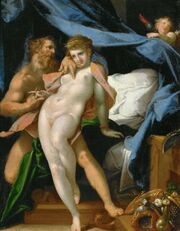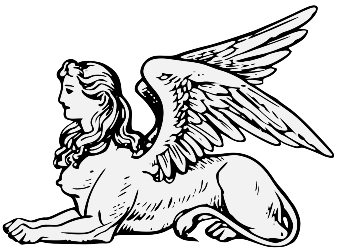Maia was the name of one of the Pleiades, seven daughters of Atlas and Pleione. She was the mother of the Olympian Hermes by Zeus, as such she features in myths about his birth and early life. Maia is also associated with fertility and growth (particularly in Roman mythology.
Maia was one of seven Pleaides; the others were her sisters Taygete, Celaeno, Alcyone, Electra, Sterope and Merope. Maia was traditionally the eldest of the sisters. They were transformed into stars by Zeus, to save them from the advances of Orion. In some legends, Electra faded away after the Sack of Troy, but in others it is Merope, who is ashamed of her relationship with Sisyphus.
In mythology
Hermes
After Maia bore Hermes, she wrapped him in blankets and went to sleep. By night-fall of his first day, Hermes, who was rapidly maturing, stole the cattle of his half-brother Apollo. When Apollo told Maia, she refused to believe him. Zeus, however, sided with Apollo. Hermes and Apollo were reconciled; Hermes gave his brother the lyre (which he created from a tortoise shell) and received the caduceus. Each item became associated with the other.

Vulcan and Maia
===Arcas and Callisto===
Maia raised Arcas, the son of the nymph Callisto and Zeus. Outraged by her husband, Hera turned Callisto into a bear. Arcas later lived at the court of his maternal grandfather (King Lycaon). However, during a feast Lycaon attempted to sacrifice his grandson to test the omnipotence of Zeus, challenging the god to deliver Arcas from the flames whole and unharmed. Zeus did so, turning on Lycaon and changing him into a werewolf (or lycanthrope).
Arcas eventually became king upon the death of his uncle Nyctimus. He taught his people to weave and bake. When hunting, he came upon a bear (his mother), who recognised him and came to embrace him. Arcas, however, shot and killed the bear with arrows. Zeus took pity on them and turned them into the constellations Ursa Major (Callisto) and Ursa Minor (Arcas). Nevertheless, Hera instructed Tethys to ensure the constellations remain in place, not setting below the horizon.
Maia and Mercury inside a silver cup
In Roman myth
The Roman Maia was associated with growth; her name was thought to relate to "maius" ("larger", "greater"). The Roman name may be an independent homonym who absorbed the myths and associations of the Greek through the synthesis of Latin and Greek literature. This Maia is associated with Vulcan (Hephaestus), Ops (Rhea) and Juno (Hera), as well as Terra/Gaia and Cybele.
Her name is also thought to be related to the month of May ("mensis Maius"), but this connection may be through the "maiores" (ancestors), which is in turn connected to the concept of being "greater" in generational precedence. Mercury, the Roman form of her son Hermes, was also venerated at points during this month.
| Pleiades of Greek mythology | |
|---|---|
| Alcyone • Celaeno • Electra • Maîa • Merope • Sterope • Taygete | |
